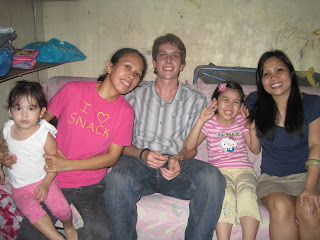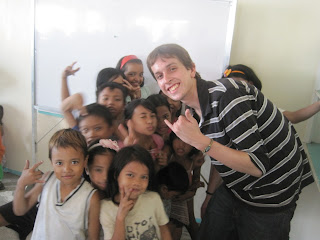So I have been real busy at work nowadays because of this pending court-case in Japan. I think I described it in my earlier posts but just in case I didn't, we are filing a law suit against the Japanese government to change their overly strict rule for the acquisition of Japanese nationality for those of Japanese parentage born in a foreign country. The law now is that if you do not contact the Japanese embassy within 3 months of the birth of the child it just becomes impossible. Most people don't know about this time limit so their children are denied their rights as a Japanese so anyway my co-worker and I have been traveling around Manila and different provinces to collect video statements for those who cannot be at the trial personally. It has brought me to Olongapo where there was a massive US military base. Following the eruption of Mt. Pinatunbo in 1991 amid a political dispute with the Philippine government and as the ash cloud swelled rendering any air travel impossible, the US government decided to completely withdraw their troops. It's interesting that they would leave the Philippines since the Japanese are unsuccessful at negotiating with the US to remove the troops from Japanese territory. But I believe there are underlying reasons for this which I hope Wikileaks will shed some light on.
Olongapo was the “sin city” of the Philippines before the Americans left. The place was notorious for prostitution and other naughty things. Today, it is very different. There is still prostitution but I don't think it is much more than other major cities of the Philippines. The family we met there was very nice and the mother was quite a fun lady. As has been my consistent experience here, the people were extremely sweet. I was not enamored by the city itself. It was kind of bizarre for me because the area by the base seemed almost like America. There were real stop signs (trust me it is rare to find stop signs much less crosswalks in Quezon City) which for some reason felt it was necessary to notify the driver that “The first to stop is first to go”. The other thing I was struck by was that the US military really just picked up and left without clearing out their crap. I didn't really expect them to disassemble all the old hangers and barracks but it was funny to see that the Filipinos had adapted the places to their own needs. The actual base itself has become a touristy place sporting jungle adventure parks with zip lines and monkeys. You can swim with dolphins down in the bay where US battle cruisers used to be docked.
After dinner I walked out to a beach by myself and I tried to analyze and assess the impact of the American base here. There are American bases all over the world and it would be foolish to imagine they don't affect the local area but it would also be foolish to think their impact are entirely negative. It's like with Okinawa, I talked to some Japanese that said if the US military just left than the local economy there would collapse. That's probably true to some extent but I'm confident they would be able to rebound. There are a lot of ideological reasons to dislike the American military to be everywhere and it really depends on your political point of view and your sense of national dignity. I will say I am comfortable with the American military being in foreign countries as long as they serve some beneficial purpose for those in the country they occupy but as time goes on and the American deficits grows I have a feeling the US government will soon see that all of these bases might not be feasible to maintain. I am not proud of the fact that the US military attracted tons of prostitution to this city but I saw a lot of mixed couples of American and Filipinos while I was there so to my reckoning if American guys were able to find love in a country that I love then they I can't be all against it.
Following our successful trip to Olongapo we visited another client in Manila. She's a Muslim lady living in a Muslim area of Manila. Unfortunately, like a lot of the Muslim areas here, it is quite a poor place. Her house was small but cozy. She has a mixed Japanese-Filipino daughter but her husband had already died. Her daughter is about nine or ten years old I think. She is very cute and surprisingly entrepreneurial. She runs a small business among the community by selling toys she gets from McDonalds or Jollibee. She came to the Christmas party at our office and I thought it was funny that she had saved all of the candy that my boss gave her and sold them to her classmates. She can make 80-100 pesos a day which for a nine year old is impressive. We spent several hours there to hammer out the statement for the trial and we had time to talk about this or that. Filipinas like most ladies love to chat and it was all in Tagalog so understood about a quarter of it but my co-worker would translate the important bits.
As we discussed, through my broken understanding we seemed to hit a serious topic and I see her eyes swell with tears. She was describing how she would give her daughter money for lunch at school but often she would just save the money and use it to buy food for her mother or sister or invest it in her toy business. I could sense the sadness from her that she couldn't adequately provide for her daughter. She held her little girl and tried to reassure her, and herself probably, that it would all be alright in the end. I was surprised by this sudden out burst of emotion but I was moved by the love I saw in her eye and I could not say anything in response.
Today I went with my roommate to Smokey Mountain. It didn't have anything to do with my NGO but I was invited by a Japanese friend to a Christmas party over there where we gave out food and clothes. Now it's kind of hard to describe this place but to sum it up concisely, it's a massive trash dump where over 3,000 people live. This slum is probably one of the poorest in Manila. You can see from the pictures that it is by no means hygienic. Children dig through the trash with almost no clothes on looking for scraps of food or whatever other valuable things they can find in the garbage. So we went there and we had to hand out tickets to children so they could receive some free lunch. It was a really simple meal; just a burger and some juice but the demand exceeded the supply ten-fold. We walked through the place with a Filipina lady who was a staff at that NGO; which was called Basura House. She supposedly had some criteria for who she gave the tickets to because she turned away more than half of them. My job was to mark the hand of the children so that they would not get more than one ticket. I understand the need to ration out the food since we definitely didn't have enough to feed everyone but it is not fun to have to choose those who should get some food. I thought I was lucky since I was just marking the hands but at the end the lady gave me about 5 or so and asked me to choose some people to give it to. This was one of the least enjoyable experiences of my life. Imagine being surrounded by 30 people or so, children, the elderly, and between, and you only have 5 tickets to give out. Again, as I said, the ticket only got them a burger a cup of juice but I felt like I was giving out winning lottery tickets. There were dozens of hands in my face, children climbing me, and everyone was screaming. I gave out those tickets as fast I could. There's no way to analyze who needs it more than others. I just wanted to relinquish the power as quickly as possible. Honestly by the end of it I had disappointed more people than not so I felt like I done them a disservice instead of helping them.
After the distribution of the tickets we had the party itself which was memorable. The food was supplied by Jollibee which is a local fast-food restaurant. I wasn't expecting it but out of nowhere some guy dressed up like the “Jolly Bee” surprised the kids. They were ecstatic and I almost went deaf from the screams. The kids there were adorable and very sweet.
After distributing the food we gave out some donated clothes. I was in charge of distributing some woman's clothes and it was funny how picky those ladies were. I mean we are giving these out for free and I assume they all live below the poverty line but they kept complaining about the color or that the material was not soft. It was kind of funny but I see their point. There's no point getting clothes you're never going to wear.
By the end of the party we were cleaning up and I was amused by the fact that the major concern of the Japanese girl I went there with was that they hadn't thrown away the trash properly. She insisted on having different trash bins there for recyclables or perishables or just trash. She was complaining that the children just through the trash on the ground and to assuage her frustration some the local ladies swept up some of the trash outside the house. Honestly though that place was literally a trash dump. All of the trash of Manila gets dumped there so to expect the locals there to follow some rules about littering and recycling was kind of ridiculous in my opinion. I tried to explain to her that these people purposefully live in a trash dump so they have bigger problems than caring about littering, We stayed there until 2 or so. I didn't eat any breakfast but I didn't have any appetite by the time I left. It's not that I was somehow disgusted by the people or the surroundings but being around hungry and impoverished people just didn't inspire any inclination to think about food.
I was thinking about my experience there and if I can draw some insight from it. My stay here has been a process of self-growth and understanding of the Philippines but also the human condition itself. To sum it up in a few words would be inadequate but I should try but not now...





















